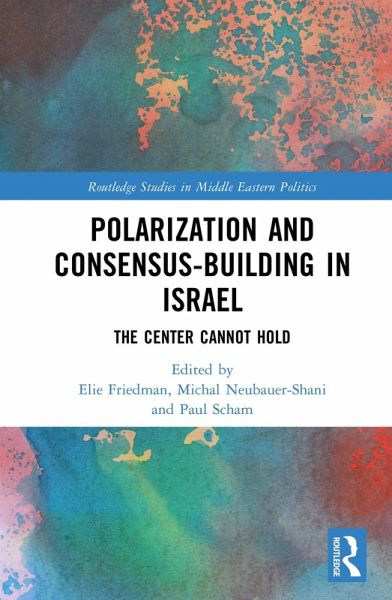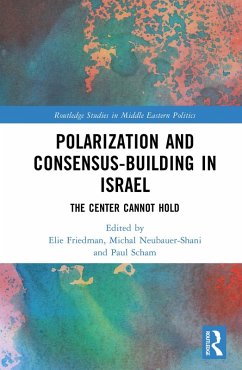
Polarization and Consensus-Building in Israel (eBook, ePUB)
The Center Cannot Hold
Redaktion: Friedman, Elie; Scham, Paul; Neubauer-Shani, Michal
Versandkostenfrei!
Sofort per Download lieferbar
39,95 €
inkl. MwSt.
Weitere Ausgaben:

PAYBACK Punkte
20 °P sammeln!
This edited volume examines the most pressing social and political issues confronting Israel from a multidisciplinary perspective, focusing on the breakdown of social solidarity and the inability to formulate consensus.The contributors - encompassing political scientists, historians, communication researchers, sociologists, economists, and educators - focus on specific topics that serve as exemplary cases of various trends of consensus and polarization. These trends are examined in the context of ideological, religious, economic, national, and ethnic cleavages. In addition, this volume analyze...
This edited volume examines the most pressing social and political issues confronting Israel from a multidisciplinary perspective, focusing on the breakdown of social solidarity and the inability to formulate consensus.
The contributors - encompassing political scientists, historians, communication researchers, sociologists, economists, and educators - focus on specific topics that serve as exemplary cases of various trends of consensus and polarization. These trends are examined in the context of ideological, religious, economic, national, and ethnic cleavages. In addition, this volume analyzes how political actors' preference for "non-decision" on various issues has resulted in the maintenance of a status quo, with cleavages or conflicts being neither mitigated nor polarized. Together, this collection of articles paints a picture of Israel as a state racked by increasing polarization along ideological and religious lines. It is argued that this difficulty in determining a consensual definition of the state threatens to destroy social solidarity in Israel altogether, a climate in which "the center cannot hold."
This book is essential reading for anyone seeking to understand the major internal threats to Israel's self-definition as a Jewish-democratic state and will also appeal to sociologists and political scientists interested in global polarization trends.
The contributors - encompassing political scientists, historians, communication researchers, sociologists, economists, and educators - focus on specific topics that serve as exemplary cases of various trends of consensus and polarization. These trends are examined in the context of ideological, religious, economic, national, and ethnic cleavages. In addition, this volume analyzes how political actors' preference for "non-decision" on various issues has resulted in the maintenance of a status quo, with cleavages or conflicts being neither mitigated nor polarized. Together, this collection of articles paints a picture of Israel as a state racked by increasing polarization along ideological and religious lines. It is argued that this difficulty in determining a consensual definition of the state threatens to destroy social solidarity in Israel altogether, a climate in which "the center cannot hold."
This book is essential reading for anyone seeking to understand the major internal threats to Israel's self-definition as a Jewish-democratic state and will also appeal to sociologists and political scientists interested in global polarization trends.
Dieser Download kann aus rechtlichen Gründen nur mit Rechnungsadresse in A, B, BG, CY, CZ, D, DK, EW, E, FIN, F, GR, HR, H, IRL, I, LT, L, LR, M, NL, PL, P, R, S, SLO, SK ausgeliefert werden.













